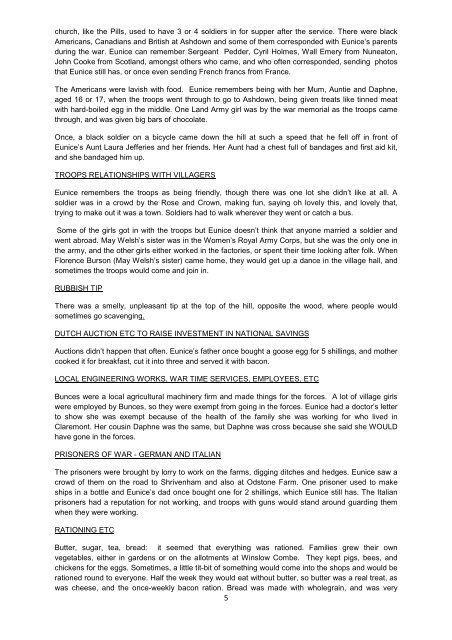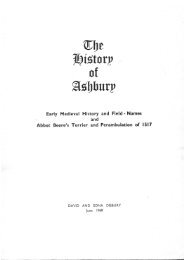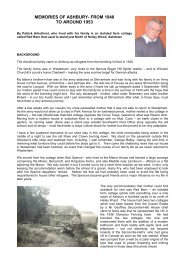Eunice Gigg Memories - Ashbury
Eunice Gigg Memories - Ashbury
Eunice Gigg Memories - Ashbury
You also want an ePaper? Increase the reach of your titles
YUMPU automatically turns print PDFs into web optimized ePapers that Google loves.
church, like the Pills, used to have 3 or 4 soldiers in for supper after the service. There were black<br />
Americans, Canadians and British at Ashdown and some of them corresponded with <strong>Eunice</strong>’s parents<br />
during the war. <strong>Eunice</strong> can remember Sergeant Pedder, Cyril Holmes, Wall Emery from Nuneaton,<br />
John Cooke from Scotland, amongst others who came, and who often corresponded, sending photos<br />
that <strong>Eunice</strong> still has, or once even sending French francs from France.<br />
The Americans were lavish with food. <strong>Eunice</strong> remembers being with her Mum, Auntie and Daphne,<br />
aged 16 or 17, when the troops went through to go to Ashdown, being given treats like tinned meat<br />
with hard-boiled egg in the middle. One Land Army girl was by the war memorial as the troops came<br />
through, and was given big bars of chocolate.<br />
Once, a black soldier on a bicycle came down the hill at such a speed that he fell off in front of<br />
<strong>Eunice</strong>’s Aunt Laura Jefferies and her friends. Her Aunt had a chest full of bandages and first aid kit,<br />
and she bandaged him up.<br />
TROOPS RELATIONSHIPS WITH VILLAGERS<br />
<strong>Eunice</strong> remembers the troops as being friendly, though there was one lot she didn’t like at all. A<br />
soldier was in a crowd by the Rose and Crown, making fun, saying oh lovely this, and lovely that,<br />
trying to make out it was a town. Soldiers had to walk wherever they went or catch a bus.<br />
Some of the girls got in with the troops but <strong>Eunice</strong> doesn’t think that anyone married a soldier and<br />
went abroad. May Welsh’s sister was in the Women’s Royal Army Corps, but she was the only one in<br />
the army, and the other girls either worked in the factories, or spent their time looking after folk. When<br />
Florence Burson (May Welsh’s sister) came home, they would get up a dance in the village hall, and<br />
sometimes the troops would come and join in.<br />
RUBBISH TIP<br />
There was a smelly, unpleasant tip at the top of the hill, opposite the wood, where people would<br />
sometimes go scavenging.<br />
DUTCH AUCTION ETC TO RAISE INVESTMENT IN NATIONAL SAVINGS<br />
Auctions didn’t happen that often. <strong>Eunice</strong>’s father once bought a goose egg for 5 shillings, and mother<br />
cooked it for breakfast, cut it into three and served it with bacon.<br />
LOCAL ENGINEERING WORKS, WAR TIME SERVICES, EMPLOYEES, ETC<br />
Bunces were a local agricultural machinery firm and made things for the forces. A lot of village girls<br />
were employed by Bunces, so they were exempt from going in the forces. <strong>Eunice</strong> had a doctor’s letter<br />
to show she was exempt because of the health of the family she was working for who lived in<br />
Claremont. Her cousin Daphne was the same, but Daphne was cross because she said she WOULD<br />
have gone in the forces.<br />
PRISONERS OF WAR - GERMAN AND ITALIAN<br />
The prisoners were brought by lorry to work on the farms, digging ditches and hedges. <strong>Eunice</strong> saw a<br />
crowd of them on the road to Shrivenham and also at Odstone Farm. One prisoner used to make<br />
ships in a bottle and <strong>Eunice</strong>’s dad once bought one for 2 shillings, which <strong>Eunice</strong> still has. The Italian<br />
prisoners had a reputation for not working, and troops with guns would stand around guarding them<br />
when they were working.<br />
RATIONING ETC<br />
Butter, sugar, tea, bread: it seemed that everything was rationed. Families grew their own<br />
vegetables, either in gardens or on the allotments at Winslow Combe. They kept pigs, bees, and<br />
chickens for the eggs. Sometimes, a little tit-bit of something would come into the shops and would be<br />
rationed round to everyone. Half the week they would eat without butter, so butter was a real treat, as<br />
was cheese, and the once-weekly bacon ration. Bread was made with wholegrain, and was very<br />
5




